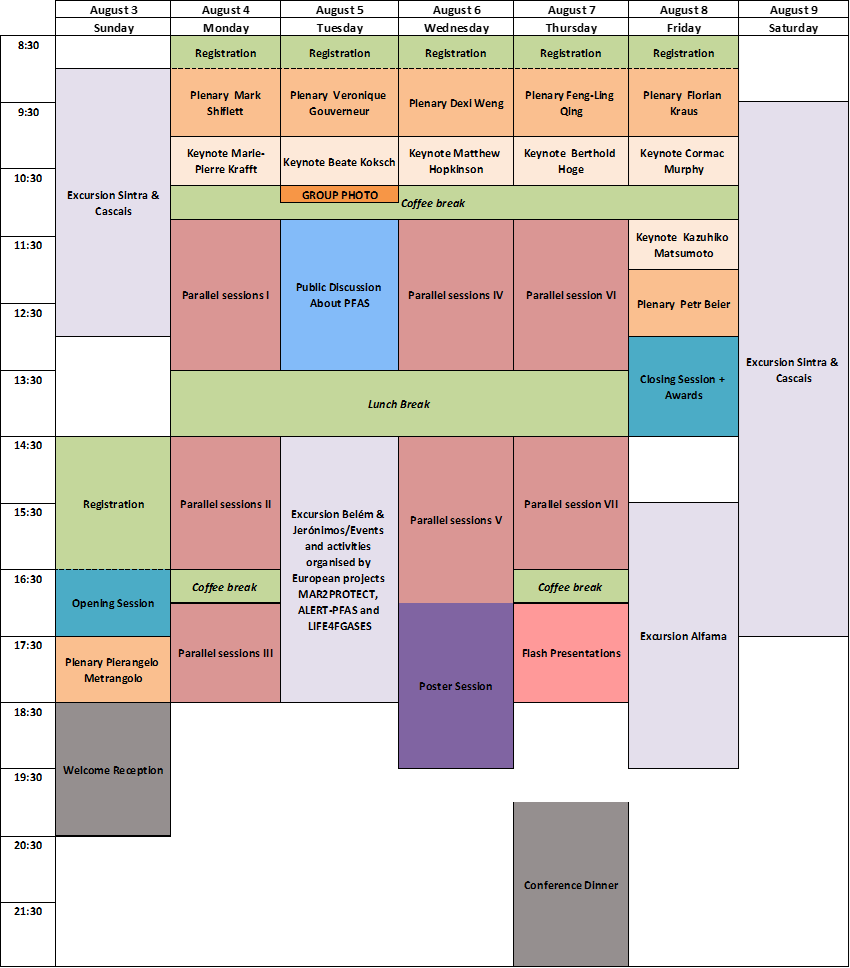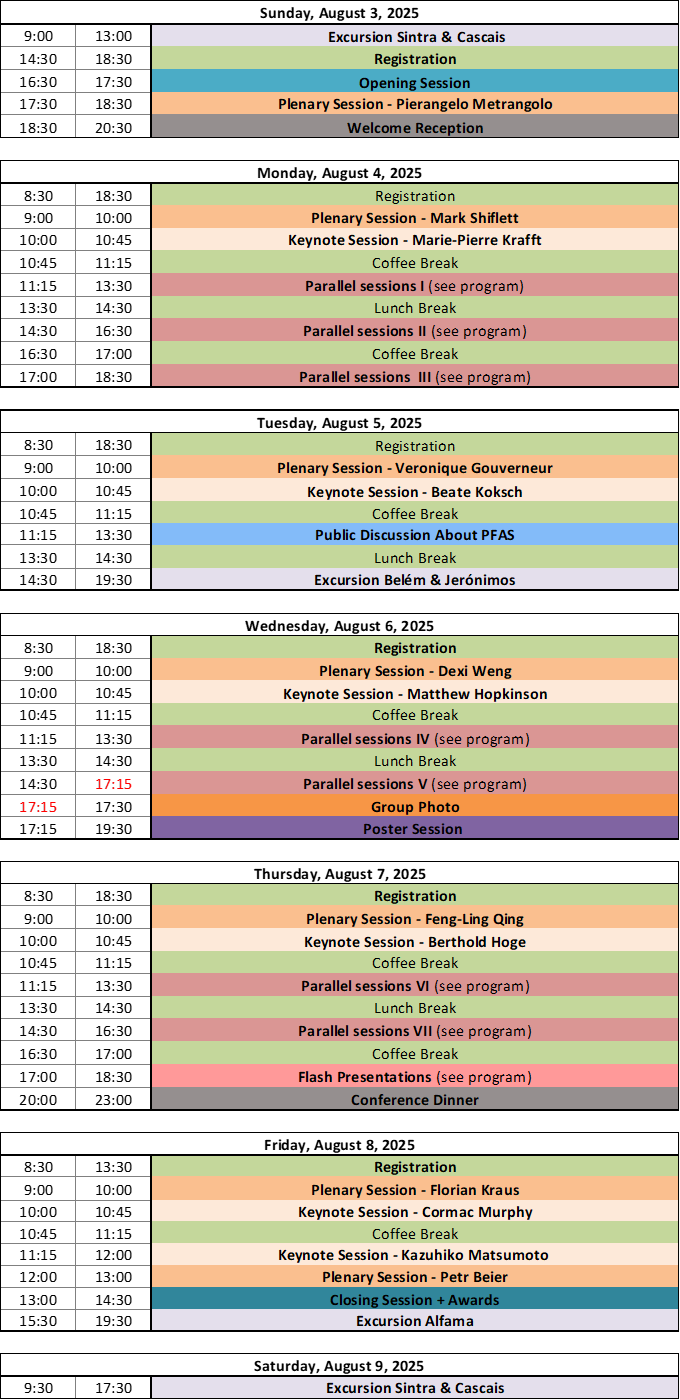Scientific Program
Short program
The short program is now available and provides an overview of all the sessions and activities.
Plenary Speakers

Petr Beier
Institute of Organic Chemistry and Biochemistry, Czech republic
Fluorinated Organic Azides in Synthesis and Bioconjugation

Veronique Gouverneur
University of Oxford, UK
Rethinking Fluorine Chemistry with Global Challenges in Mind

Pierangelo Metrangolo
Politechnico di Milano, Italy
Intermolecular Recognition Phenomena Involving Poly-Fluoroalkyl Amphiphiles

Feng-Ling Qing
Shanghai Institute of Organic Chemistry, China
Synthesis and Application of Pentafluorosulfanyl (SF5)-Containing Reagents

Dexi Weng
Dexyan Global, USA Comeall Technology, China
Calcium fluoride (fluorpar) to perfluoroorganic materials to data OPTICALization

Mark Shiflett
Wonderful Institute for Sustainable Engineering, University of Kansas, USA
NSF Engineering Research Center EARTH (Environmentally Applied Refrigerant Technology Hub)

Florian Kraus
Philipps-Universität Marburg, Germany
Oxidation of Halogen Pentafluorides and N2
Keynotes

Matthew Hopkinson
Newcastle University, UK
Novel Methods for Installing Emerging Fluorinated Motifs

Berthold Hoge
Universität Bielefeld, Germany
The First Main Group Element Lewis Acid Thionyl chloride Adduct and its Chemistry

Beate Koksch
Freie University of Berlin, Germany
Fluoropeptides as biodegradable biopolymers

Kazuhiko Matsumoto
Kyoto University, Japan
Fluorine Chemistry in Energy Applications

Marie-Pierre Krafft
Institut Charles Sadron (UPR 22) University of Strasbourg, France
Per- and Polyfluoroalkyl Substances (PFASs): A Tale of Two Faces Focusing on the Supramolecular Self-Assembling Propensity of PFAS Surfactants

Cormac Murphy
University College Dublin, Irland
Microbial Enzymes That Degrade PFAS
Confirmed Invited Speakers
Alison Stuart, University of Leicester, UK
Atef Jaouani, University of Tunis El Manar, Tunisia
Bruno Ameduri, Institute Charles Gerhardt Montpellier, France
David O’Hagan, St. Andrew's University, UK
David Vicic, Lehigh University, USA
Dominique Cahard, Université de Rouen Normandie, France
Fèlix Llovell, Universitat Rovira i Virgili, Spain
Filipe Ferreira da Silva, NOVA FCT, Portugal
Frédéric Leroux, University of Strasbourg, France
Frederik Diness, Roskilde University, Denmark
Gabriel Zarca, Universidad de Cantabria, Spain
Gašper Tavčar, Jožef Stefan Institute, Slovenia
Gavin Chit Tsui, The Chinese University of Hong Kong, Hong Kong
Gideon Wolfaardt, Stellenbosch University, South Africa
Gilles Mailhot, Institut de Chimie de Clermont-Ferrand, France
Giuseppe Resnati, Politecnico di Milano, Italy
Henryk Koroniak, Adam Mickiewicz University, Poland
Hideki Amii, Gunma University, Japan
Ingo Krossing, Institut für Anorganische und Analytische Chemie and Freiburg Materials Research Center FMF, Germany
Ivo Leito, University of Tartu, Estonia
Jaroslav Kvíčala, University of Chemistry and Technology, Czechia
Jason Dutton, La Trobe University, Australia
Jean-François Paquin, Université Laval, Canada
Jean-Marc Vincent, University of Bordeaux - CNRS, France
Jesper Bendix, University of Copenhagen, Denmark
Jinbo Hu, Shanghai Institute of Organic Chemistry, China
Jolanta Dvarioniene, Kauno technologijos universitetas, Lithuania
Joseph S. Thrasher, Clemson University, USA
Lourdes Vega, Khalifa University, UAE
Maik Finze, University of Würzburg, Germany
Manuel Martínez Piñeiro, Universidade de Vigo, Spain
Marisa Almeida, CIIMAR, Portugal
Mark Crimmin, Imperial College London, UK
Mark Gandelman, Israel Institute of Technology, Israel
Marta Oliveira, Faculdade de Ciências da Universidade do Porto, Portugal
Michael Gerken, University of Lethbridge, Canada
Michael Rack, BASF, Germany
Miguel Baya García, Universidad de Zaragoza, Spain
Miroslav Boča, Institute of Inorganic Chemistry at Slovak Academy of Sciences, Slovakia
Mona Semsarilar, University of Montpellier, France
Nebojša Ilić, PFASuiki GmbH, Germany
Noel Nebra, LHFA- Université Paul Sabatier, France
Norio Shibata, Nagoya Institute of Technology, Japan
Norman Lu, Taipei University of Technology, Taiwan
Qilong Shen, Shanghai Institute of Organic Chemistry, China
Rimantas Knizikevičius, Kaunas University of Technology, Lithuania
Robert J. Baker, Trinity College Dublin, Ireland
Rodrigo Cormanich, University of Campinas, Brazil
Sergio Salinas, IHE Delft Institute for Water Education, The Netherlands
Thierry Billard, University of Lyon - CNRS, France
Thomas Braun, Humboldt Universität zu Berlin, Germany
Uta Wehn, IHE Delft Institute for Water Education, The Netherlands
Valentina Dichiarante, Politecnico di Milano, Italy
Wojciech Grochala, University Warsaw, Poland
Yoshimitsu Itoh, The University of Tokyo, Japan
Conference Schedule

Sessions on PFAS and European Project Activities
As part of the 21st European Symposium on Fluorine Chemistry (ESFC Lisbon 2025), three cutting-edge European projects—MAR2PROTECT, ALERT-PFAS, and LIFE4F-GASES—join forces to explore policy, science, and innovation around PFAS and environmental sustainability.
Please check all the information here Sessions on PFAS and European Project Activities
Register here: https://forms.office.com/e/7p5cYjHEAG
5th August in the morning (11.15h - 13.30h):
ESFC Lisbon is also thrilled to introduce a special PFAS Panel Discussion as part of the ESFC program! Perfluoroalkyl and Polyfluoroalkyl substances (PFAS) known as "forever chemicals," will be a central topic at the 21st European Symposium on Fluorine Chemistry, bringing together scientists, industry, consumers, policy makers... to tackle one of the most pressing challenges of our time involving all agents so call Quintuple-Helix.
PFAS Panel Discussion
Roundtable 1: Policy Recommendations for Contaminants of Emerging Concern (11:15 AM - 12:15 PM)
Dive into expert's opinions searching for policy recommendations to improve regulatory frameworks and EU policy strategies aimed at managing PFAS and other emerging contaminants.Roundtable 2: Sustainable and safe PFASs for health and the environment (12:30 PM - 1:30 PM)
Explore innovative approaches to developing sustainable PFAS alternatives that balance industrial needs with environmental and human health priorities.These sessions offer a unique opportunity to engage with global experts, share insights, and shape the future of PFAS research, regulation and safety implementation.
5th August in the afternoon (14.30h – 18.30h):
Events and activities organised by European projects MAR2PROTECT, ALERT-PFAS and LIFE4F-GASES.
These three European projects will mark the beginning of a new era for innovative solutions in combating global environmental challenges. Different events and activities will feature interactive engagement with stakeholders from the mentioned projects. This action will be a great opportunity for members of the public, society, policy makers and participants of the congress to contribute for sustainable future.
Some information about these European projects:
MAR2PROTECT (Mid-term event): At the heart of this project is an Artificial Intelligence-driven tool that processes real-time data from sensors in high-risk sites. The M-AI-R Decision Support System integrates technological solutions and societal engagement preferences to enhance groundwater quality and quantity, representing a new generation of Managed Aquifer Recharge methods.
ALERT-PFAS (Co-creation workshops): This Interreg SUDOE project offers an innovative solution for real-time detection and monitoring of PFAS. It aims to prevent these substances from entering the water cycle, with pilot actions planned in natural parks and protected areas of Portugal, Spain, and France that have recently suffered from wildfires.
LIFE4F-GASES (Final event): The objective of the LIFE-4-FGASES project is to demonstrate a technology that allows the selective recovery of fluorinated gases present in different commercial blends frequently used in the refrigeration sector, so you can apply circular economy and reuse these compounds, minimising their environmental impact.

